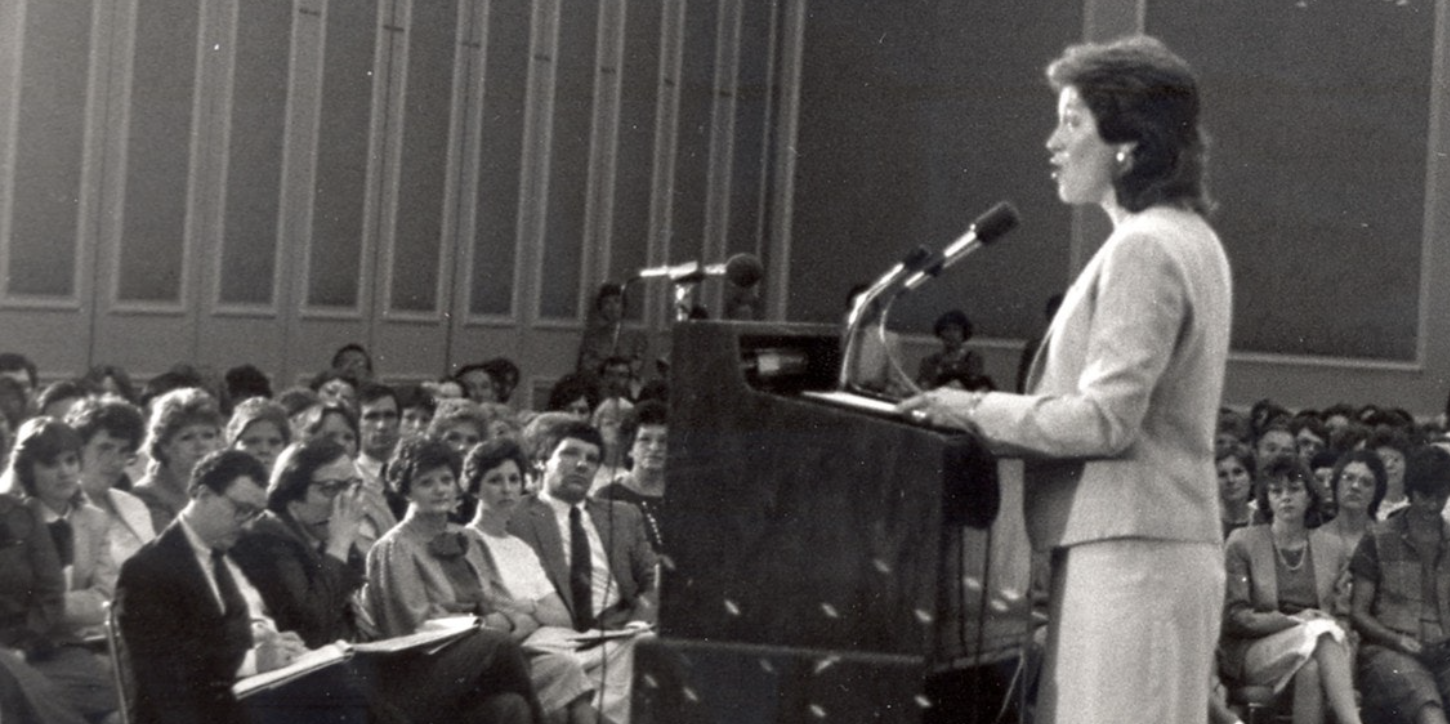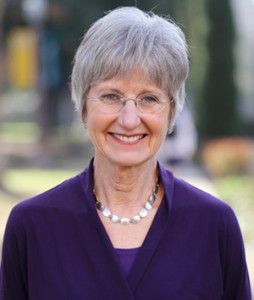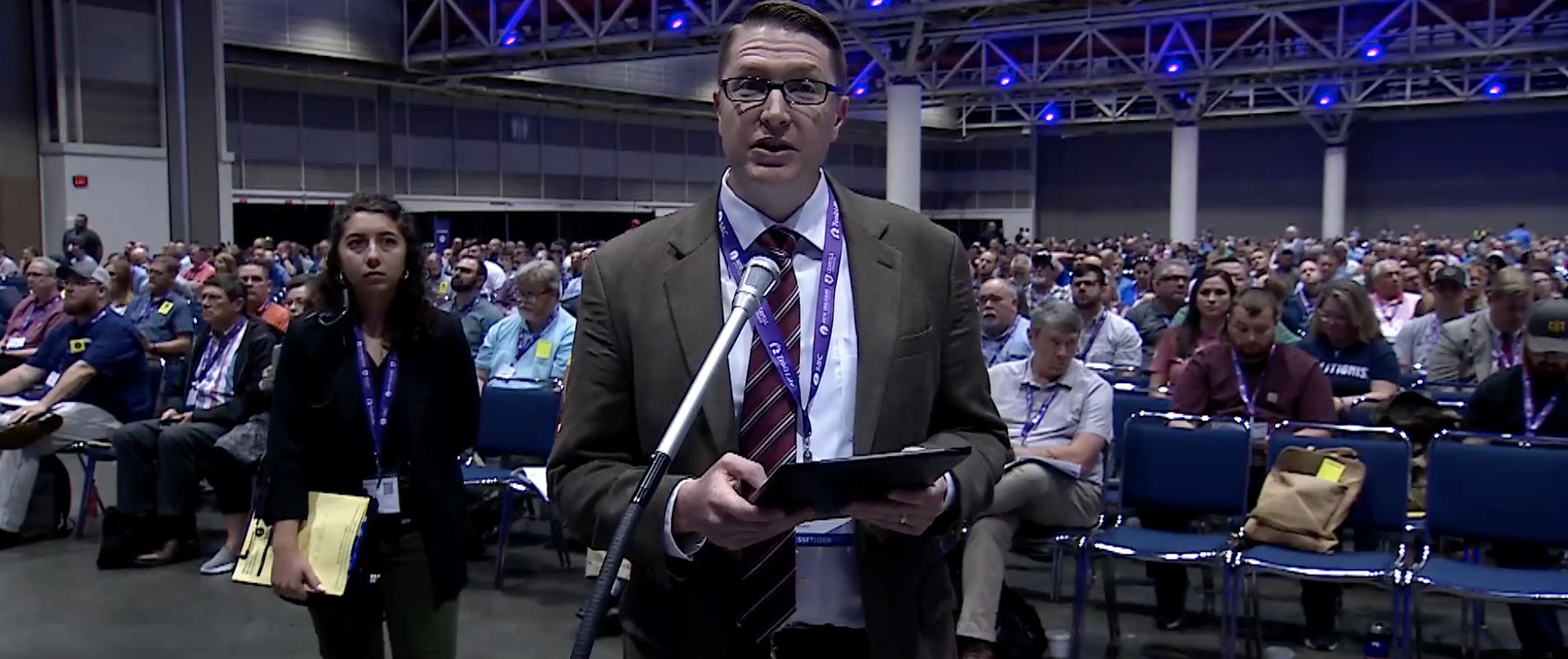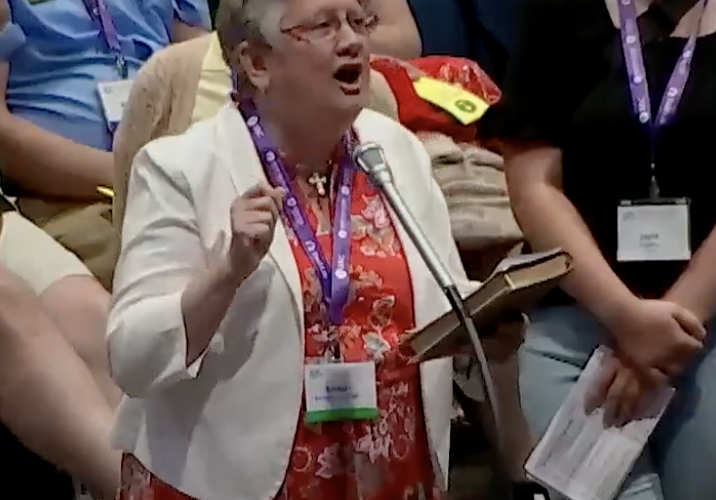Next week, the Southern Baptist Convention will hold its annual meeting in Indianapolis and vote on the second reading of what has come to be known as the Law Amendment.
A proposed amendment to the SBC’s Constitution, named after the Virginia pastor who began the crusade for it, will be considered for its second and final reading. The amendment would fortify the practice of deeming churches that affirm, appoint or employ women as pastors of any kind as not in friendly cooperation with the SBC and worthy of being disfellowshipped.
As conflict over this amendment has ensued the past year, people often have asked me — with how clear the SBC has made their position on women’s inequality in the past — why are some SBC leaders pushing for this amendment now?
My simple answer to this question is backlash.
For almost 50 years, the SBC has demonstrated a pattern of meeting any potential gains for women and any possible threats to conservative male power with a wave of backlash to enforce the oppression of women.

Some participants in the 1978 Consultation on Women in Church-Related Vocations. (Screencap)
A consultation followed by the takeover
For example, on Sept. 20-22, 1978, 11 SBC agencies came together to hold the Consultation on Women in Church-Related Vocations. Support came from SBC seminaries, as well as other entities including the Foreign Mission Board, Home Mission Board, Christian Life Commission and Woman’s Missionary Union.
The purpose of the consultation was to “address the changing roles and rising demands of women in missions, ministry and other Baptist professions.”
In the addresses given at the conference, both men and women made the call for equal opportunity for and treatment of women in ministry and leadership among Baptists. In one session, Randall Lolley, then president of Southeastern Baptist Theological Seminary, even said, “We confess, I do, on our behalf, and perhaps across the convention, the need for more femaleness in our teaching staff.”
“We confess, I do, on our behalf, and perhaps across the convention, the need for more femaleness in our teaching staff.”
Baptist historian Melody Maxwell commented that after the 1978 consultation, “The denomination appeared on track to allow women to serve in all pastoral roles.”
But the very next year, backlash came with the start of the fundamentalist takeover of the SBC orchestrated by Paul Pressler and Paige Patterson. The takeover, which started in 1979, pushed conformity on matters of theology, unconditional belief in the inerrancy of Scripture, and complete agreement on the matter of women’s submission and limitations in ministry.
One might think the progress of the 1978 consultation followed by the initiation of the fundamentalist takeover the very next year is a coincidence, but it’s not the only example.
The beginnings of support suppressed by resolve for the Edenic Fall
Despite the efforts of the takeover, many Southern Baptist women continued to believe God called them to ministry, and they expected their congregations to affirm those callings the same way they did for men.
In 1983, with the support of the SBC Christian Life Commission and Woman’s Missionary Union, Nancy Hastings Sehested gathered a group of women to form an organization that was then named Women in Ministry, SBC, but is now called Baptist Women in Ministry. The group’s purpose was to encourage, affirm and provide support for women in ministry within the SBC.

Sarah Frances Anders speaks at an early gathering of Baptist women in ministry in 1982.
The first public gathering of the group was the two days prior to the 1983 SBC annual meeting in Pittsburgh. With around 80 people present in space provided by Woman’s Missionary Union, the meeting featured lectures, storytelling and worship with women preaching.
Additionally, during the business at the SBC annual meeting in 1983, a resolution celebrating women passed. The resolution read, in part, “Be it finally resolved, that we encourage all Southern Baptists to continue to explore further opportunities of service for Baptist women, to ensure maximum utilization of all God-called servants of our Lord Jesus Christ.”
Like the consultation in 1978, in 1983 the course for women in ministry appeared to be coming back on track with the significant victories of a new organization and a positive resolution.
But like 1979, 1984 also would bring backlash to women.
At the 1984 SBC annual meeting in Kansas City, another resolution was adopted, and this one would not be so affirming of women.
The 1984 resolution “On Ordination and the Role of Women in Ministry” read, in part: “While Paul commends women and men alike in other roles of ministry and service (Titus 2:1-10), he excludes women from pastoral leadership (1 Timothy 2:12) to preserve a submission God requires because the man was first in creation and the woman was first in the Edenic fall. … Therefore, be it resolved that …we encourage the service of women in all aspects of church life and work other than pastoral functions and leadership roles entailing ordination.”
For those who might question whether the resolution was backlash to 1983, an interview with Susan C. Lockwood in the soon-to-be-released documentary, Midwives of a Movement, reveals the motives of certain leaders.
Lockwood, pastor of Cornell Baptist Church in Chicago at the time, described how she approached then SBC President Jimmy Draper during the business session to ask to make a statement in response to the resolution from the perspective of a female pastor. When Draper finally responded to her request, she recalls his words as, “I’m not going to let you make a statement, I’m not going to let you speak, because you women got your way last year!”

Molly Marshall preaching at the Southern Baptist Women in Ministry meeting, June 9, 1985. (Baptist Women in Ministry)
Protests met by amending a faith confession
Yet another example might be found in the resistance lodged against the ongoing fundamentalist takeover in the 1990s as protests erupted when Russell Dilday was fired from his role as president of Southwestern Baptist Theological Seminary, Diana Garland was fired as dean of the Carver School of Social Work at Southern Baptist Theological Seminary and Molly Marshall “resigned” from her role on the faculty of Southern Seminary.

Diana Garland
Lest those protesters get any idea that they have traction, backlash came again as the leaders of the conservative SBC decided to use the issue of women’s submission to make sure Southern Baptists got back in line.
In 1998, the SBC added an amendment, “The Family,” to the Baptist Faith and Message reading in part, “A wife is to submit herself graciously to the servant leadership of her husband even as the church willingly submits to the headship of Christ.”
The editors of the document even admit that the addition of the amendment was not added for its own merits, but to answer “cultural confusion with the clear teachings of Scripture.”
“While both men and women are gifted for service in the church, the office of pastor is limited to men as qualified by Scripture.”
Further, the amendment, along with other changes, would be included in the full revision of the document adopted in 2000. Among other changes, the new faith statement added a line to the article on the church that reads, “While both men and women are gifted for service in the church, the office of pastor is limited to men as qualified by Scripture.”
A threat to the free exercise of conservative male power once again was met with backlash in the form of making sure women knew their place.

Virginia pastor Mike Law addressing the 2023 SBC annual meeting in New Orleans.
Focused response to sexual abuse exchanged for enforcing limitations on women
So, to understand why the Law Amendment was first promoted in late 2022 and voted on in 2023, consideration must be given to recent actions in the SBC which the conservative male leadership may have deemed worthy of backlash.
Notably, in May 2022, Guidepost Solutions released a 288-page investigative report detailing how SBC leaders obstructed the proper handling of sexual abuse and misconduct, denigrated survivors of sexual abuse and ignored survivors’ claims.
One month later, messengers to the 2022 SBC meeting voted to form a Sexual Abuse Reform Implementation Task Force to implement recommendations from the Guidepost report.
In light of such devastating revelations, one might think the task force would be the priority of SBC leadership in the years to come, and they would prioritize recognizing, confessing, reforming the heinously sinful actions of not protecting victims and survivors or having adequate prevention resources.
But instead, attention turned to kicking out churches, such as Saddleback Church in Southern California and Fern Creek Baptist Church in Louisville, Ky., which had women serving in pastoral roles. The biggest news and focus of the 2023 SBC annual meeting was not the implementation of systems to protect women and other victims and survivors of abuse, but the imposition of more restrictions on women’s ability to serve in pastoral ministry.
“For reform to happen, women, who are most often the victims of sexual abuse, must be seen as worthy of protection.”
In order to take sexual abuse seriously, the full humanity and dignity of women must be affirmed. For reform to happen, women, who are most often the victims of sexual abuse, must be seen as worthy of protection.
But, consciously or unconsciously, the affirmation of women’s value perceived in the response to the Guidepost investigation may have been viewed as a possible gain for women’s equality and a potential threat to conservative male power.
Therefore, the backlash that met calls to protect women and other survivors of abuse was to enforce limitations on women’s leadership and to reinforce that women do not have equal value to God or the church.
Consequently, and sadly, as the second reading of the Law Amendment is considered at the 2024 SBC annual meeting in Indianapolis next week, women in ministry will once again become the targets of conservative backlash against any action that threatens conservative male power by affirming women’s value.

Meredith Stone
Meredith Stone serves as executive director of Baptist Women in Ministry.
Related articles:
Churches that support women in ministry should leave the SBC preemptively | Opinion by Meredith Stone
Second vote on Law Amendment will take the spotlight at this summer’s SBC annual meeting | Analysis by Mark Wingfield


